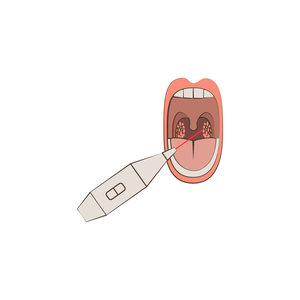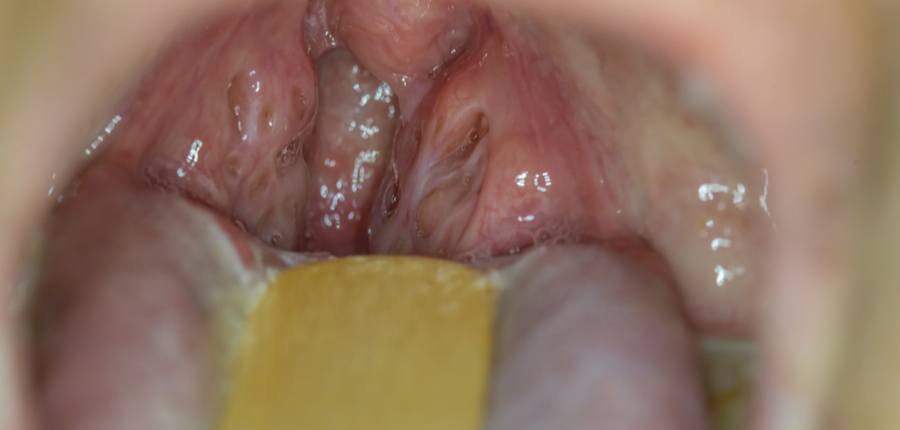
In the United States, one in every 15 adults suffers from sleep apnea. At the onset, sleep apnea seems like a trivial inconvenience. However, any health professional knows that it contributes to severe physical stress and anxiety.
Among the damaging effects of sleep apnea includes feeling lethargic throughout the day, lack of focus (brain fog), occasional bouts of a migraine, and increased risk of cardiovascular diseases – all because the brain lacks oxygen during sleep respiration. While anyone can be affected by this sleep disorder, the prevalence is often more apparent between ages 55 and 60.
Meanwhile, another throat infirmity called tonsillitis affects more children than adults. The pathogens entering the oronasal cavity are more potent among the generally weaker immune system of younger patients. This viral infection is characterized by the inflammation of the tonsils and adenoids, causing a number of symptoms such as a severe sore throat, fever, and foul breath.

Average Cost of Tonsillectomy
Tonsillectomy is a surgical procedure that entails a partial or complete removal of the tonsils. The purpose of this oral amputation is directly relative to the adverse effects of the enlarged (natural or unnatural) tonsils. Large or swollen tonsils both block air passage and causes severe discomfort in terms of swallowing solid food.
According to the American Academy of Otolaryngology, sleep apnea and chronic tonsillitis are the two main causes necessitating tonsillectomy. 80% of the procedure is aimed at dealing with obstructive sleep apnea while around 20% is compelled by infected tonsils.
In the United States, the average out-of-pocket tonsillectomy cost is anywhere from $3,600 to $6,500. For the people with health insurance, the procedure is only around 20% of the comparative rate people would pay without insurance. The estimated expense of insurance network claims is anywhere around $160 to $260.
What are Included
Accounts of consumers complaining about exorbitant prices should not completely surprise anyone. Regardless of who is at fault, circumstances that led to the outrageous final billing could have been addressed if the consumer knows exactly what he or she is paying for.
You must understand that the price ought to be strictly confined to the essentials of the operation. Patients should be wary of ‘extra fees’ being peddled by healthcare providers if such are included in these basic components:
- Surgery: this part entails the operation, routine post-operative care, and the mandatory follow-up checkup after full recovery.
- Facility: this part entails the miscellaneous cost associated with using the operating room such as the instruments, equipment, bench, and intravenous drugs and fluids. Take note: overnight stay is not included.
- Anesthesia: this entails the services of the anesthesiologist during the entire period of the operation. Take note: they usually charge per hour and extensions can increase the expenses.
Additional Costs
As mentioned earlier, one must understand the price of tonsillectomy strictly in terms of the basic components of the procedure. However, one must also understand that there are other additional costs necessary in order to perform a flawless operation (if not acquire proposals for an equally effective alternative to surgery).
- Consultation
Some people often mistake initial consultation as part of the billing. After all, the same physician recommending the procedure is most likely the same person performing it. But when it comes to choosing a physician, it is always best to remember that Ear Nose & Throat (ENT) specialists are more credible professionals in terms of gauging the need for tonsillectomy.
While a visit to a specialist costs twice the rate (around $300) offered by general practitioners (around $150), it is an investment worth every penny. Most general practitioners will either refer patients to an ENT specialist (at best) or flat out refuse tonsillectomy (at worst), often leaving them with recurring problems that aren’t completely being addressed.
- Pre-op Exam
Any patient must understand that there is a crucial need for physicians to fully determine whether or not he or she is physically fit to get operated. What most people fail to understand is that anesthesia can cause a wide range of serious adverse effects.
Around 40% of the time, patients may experience nausea, 30% could feel incision pain despite the standard dosage, and one out of 100,000 would even die due to severe shock. Being cleared for surgery is a non-negotiable standard procedure, and some physicians will recommend these tests based on his or her impression of the patient’s medical profile and history:
- CBC blood test: between $25 to $30
- Chest x-ray: around $483 (hospital) or $366 (imaging center)
- ECG test: around $183
- Strep test: around $72
- Pain medication
Attending physicians will prescribe pain medications after the operation to be taken regularly throughout the recovery period. Doctors would recommend either Opioids or NSAID’s. Exact prices may range significantly depending on what they would prescribe.
- Nausea treatment
As mentioned earlier, less than half of the people undergoing surgery will experience nausea once the procedure is completed. Anesthesia may take as much as 24 hours to completely wear off. Hence, queasiness could randomly frequently recur within this timeframe. Physicians could recommend drugs but consuming ginger (tea, ale, candy, etc) may be an effective substitute.
Shopping for Tonsillectomy Services
Choosing a particular healthcare facility can truly help lower the standard cost of a certain treatment. While there are a number of viable options in the United States, getting the procedure abroad is undoubtedly more cost-efficient. Courtesy of the ongoing advancements in medical tourism, foreign hospitals is granted global accreditations as a badge of their competitiveness.
In effect, many Americans would most likely schedule medical procedures and appointments during their vacation somewhere overseas. As far as lower out-of-pocket tonsillectomy cost is concerned, these are the following health centers worth remembering:
- Hospital Prive (Marrakech, Morocco): from $334
- Clinique Yasmin (Casablanca, Morocco): from $364
- Centre International Carthage Medical (Monastir, Tunisia): from $464
- Luxmed (Warsaw, Poland): from $629
- Medicover Hospital (Budapest, Hungary): from $905
- Clinique Pasteur (Tunis, Tunisia): from $1,000
- Chiang Mai Ram Hospital (Chiang Mai, Thailand): from $1,501
- BGS Global Hospitals (Bangalore, India): from $1,575
- KCM Clinic (Jelenia Gora, Poland): from $1,741
- KOC University Hospital (Istanbul, Turkey): from $1,741
Factors Affecting the Cost of Tonsillectomy
Tonsillectomy may be a low-risk surgical operation, but it is a type of treatment that necessitates a number of considerations. As mentioned earlier, it may take several steps to determine whether a person’s condition requires tonsillectomy in the first place.
In addition, physicians need to have a full understanding of the patient’s complete medical profile and history before scheduling him or her for operation. In essence, the complexity of the case can directly affect the overall cost of the procedure. Here are the following factors that determine how much a consumer will be paying for tonsillectomy:
- Age
Practically, tonsil removals are cheaper for children than it does for adults. Apart from the fact that young people recover faster than grown-ups, an adult’s pair of tonsils is tougher to remove. It is also important to understand that adults require a higher dosage of anesthesia, if not a greater deal of supervision during the course of the procedure.
- Location
As mentioned previously, wherever one chooses to acquire tonsillectomy is the key to acquiring a much lower out-of-pocket rate. However, price variations are not only limited to the comparison between the United States and foreign countries. Even within the nationwide scope, some locations offer cheaper rates (oftentimes directly relative to its population density and urbanization).
- Facility Type
Apart from location, understanding where one acquires tonsillectomy is also a matter of knowing what type of healthcare facility conducts the procedure. A tonsil removal costs higher in private hospitals than in subsidized government health centers. By comparison, hospitals are generally more expensive than outpatient centers or small ENT clinics.
- Health Insurance
The difference in terms of out-of-pocket cost between those with and without health insurance is vast. But even amongst people with health insurance, price variations could ensue due to a number of factors. The type of health insurance, the worth of annual deductibles, co-pay requirements, and whether or not the performing physician is part of the insurance provider’s network all come into the equation.
- Personal Health
In relation to age, the individual’s health can determine the complexity of the procedure. Conditions acquired resulting from a specific lifestyle can affect the way a physician approaches tonsillectomy. For instance, a patient who has higher blood glucose (e.g. alcoholic or diabetic) may require higher doses of anesthesia during the operation.